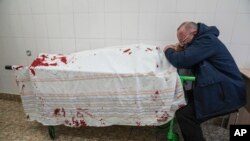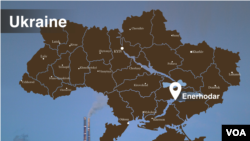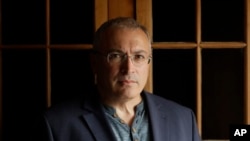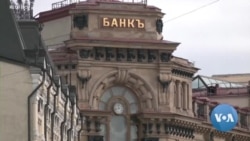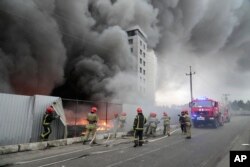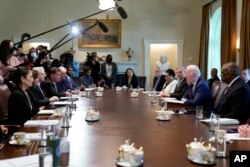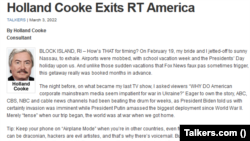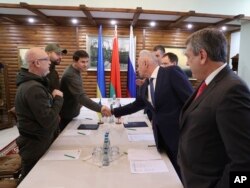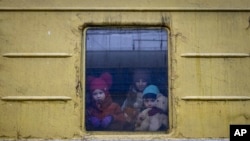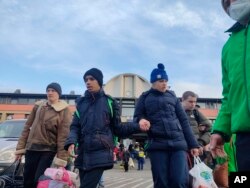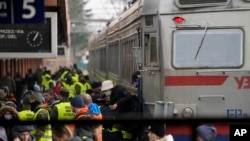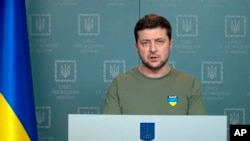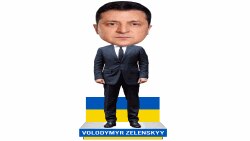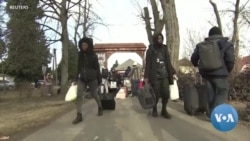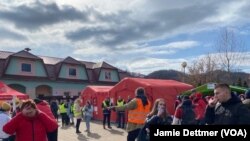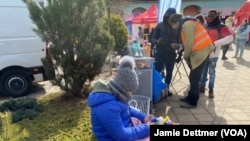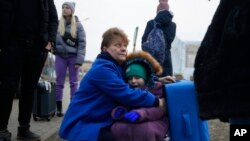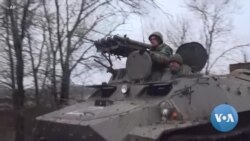For full coverage of the crisis in Ukraine, visit Flashpoint Ukraine.
For the latest developments of the conflict between Russia and Ukraine, all times EST:
11:49 p.m.: Russian forces shelled the Zaporizhzhia nuclear power plant, sparking a fire in a nearby building early Friday. International Atomic Energy Agency (IAEA) Director General Rafael Mariano Grossi said the event highlights once again why he has repeatedly stressed that any military or other action that could threaten the safety or security of Ukraine’s nuclear power plants must be avoided.
“I remain gravely concerned about the deteriorating situation in Ukraine, especially about the country’s nuclear power plants, which must be able to continue operating without any safety or security threats,” he said. “Any accident caused as a result of the military conflict could have extremely serious consequences for people and the environment, in Ukraine and beyond.” VOA has the story.
11:06 p.m.: The American Nuclear Society issued a statement condemning the attack on the Zaporizhzhia Nuclear Power Plant and saying, "Currently, there are no indications that any damage caused by the attack poses an additional threat to the public. The latest radiation level readings remain within natural background levels."
10:57 p.m.: "Essential" equipment not affected by nuclear power plant fire, Ukraine tells IAEA.
10:50 p.m.: Ukraine says radiation levels have not changed at the Zaporizhzhia Nuclear Power Plant, the IAEA says.
10:41 p.m.: U.S. President Joe Biden is also being briefed on the situation at the power plant. VOA's Anita Powell has this readout of Biden’s calls with President Volodymyr Zelenskyy of Ukraine and NNSA Administrator Jill Hruby:
"President Joseph R. Biden, Jr. spoke with President Volodymyr Zelenskyy of Ukraine this evening to receive an update on the fire at the Zaporizhzhia Nuclear Power Plant. President Biden joined President Zelenskyy in urging Russia to cease its military activities in the area and allow firefighters and emergency responders to access the site.
"President Biden also spoke this evening with Under Secretary for Nuclear Security of the U.S. Department of Energy and Administrator of the National Nuclear Security Administration (NNSA) to receive an update on the situation at the plant. The President will continue to be briefed regularly."
10:36 p.m.: The International Atomic Energy Agency says it's in contact with Ukrainian authorities about the fire at Zaporizhzhia Nuclear Power Plant.
10:32 p.m.: Officials say firefighters have been allowed to get into the power plant facility to take care of the fire.
10:03 p.m.: Here's a map showing the location of Enerhodar, home to the nuclear power plant under attack.
8:10 p.m.: Russian forces early Friday began attacking Ukraine's largest nuclear power plant, Zaporizhzhia near the city of Enerhodar on the Dnieper River, according to news reports.
Andriy Tuz, the plant spokesman, said shells were hitting the plant and had started a fire at one of its six reactors. The reactor was not operating, but there is nuclear fuel there, he said.
"As a result of shelling by Russian forces on the Zaporizhzhia Nuclear Power Plant, a fire broke out," Tuz said in a video posted on the plant's Telegram account.
The plant's power unit had been hit, he added, as Foreign Minister Dmytro Kuleba called for an immediate halt to fighting at the site.
A Ukrainian government official, speaking on condition of anonymity, told The Associated Press that radiation levels at the plant were elevated.
Earlier, Chary Rangacharyulu, a physics and engineering professor at the University of Saskatchewan in Canada, said the Russians may try to use the nuclear plants for political leverage, but he doubts they are "so foolish to destroy those facilities and let out radioactivities into the atmosphere."
"However, if they make mistakes and blow up a facility or two, the harm will not be limited to Ukraine. It will go beyond. Russia and Belarus are the neighboring countries that will be very much affected. Let us hope and pray that the Russian government is not that insane to cause harm to its own people," he said in a written response to questions from VOA.
7:30 p.m.: Ukraine is going dark, CNN says.
For reasons that are mostly strategic, the bright lights of Ukrainian cities are all but gone. Satellite images show the contrast between the nights before February 25, the night the invasion began, and after.
7:10 p.m.: From his tent in a displaced-persons camp in northwest Syria, Motaz has been watching Russia's invasion of Ukraine with one thing in mind, he told VOA.
"I can almost see the same thing that happened to us a few years ago happening to these innocent Ukrainians as well," said the 37-year-old native of Aleppo, who gave only his first name. "We watched in real time how Russia's war machine destroyed our homes, schools and hospitals."
6:50 p.m.: The BBC announced this week that it would again broadcast news via shortwave radio.
“It’s often said truth is the first casualty of war,” Tim Davie, BBC director-general, said in a statement. “In a conflict where disinformation and propaganda is rife, there is a clear need for factual and independent news people can trust.”
The announcement that BBC has launched two new shortwave frequencies in the region for four hours of “World Service English” news a day came one day after Russia struck the main TV and radio tower in Kyiv. The two frequencies can be received clearly in Kyiv and parts of Russia.
5:50 p.m.: The Biden administration will grant Temporary Protected Status to Ukrainians who are already living in the United States and unable to return to Ukraine because of the military conflict with Russia, according to a statement from Homeland Security Secretary Alejandro Mayorkas.
The move will allow Ukrainians in the United States as of March 1 to remain and work legally for 18 months, DHS said.
"Russia's premeditated and unprovoked attack on Ukraine has resulted in an ongoing war, senseless violence, and Ukrainians are forced to seek refuge in other countries," Mayorkas said in the statement. "In these extraordinary times, we will continue to offer our support and protection to Ukrainian nationals in the United States."
5:10 p.m.: VOA’s Dorian Jones in Istanbul said Turkey was locking Russian warships out of the Black Sea ahead of an expected assault on Ukrainian cities.
It was also sending more Turkish drones to Ukraine despite warnings from Moscow.
4:40 p.m.: VOA’s Ihar Tsikhanenka, reporting from New York, and Edward Yeranian, reporting from Cairo, say the conflict between Russia and Ukraine has left global oil and gas markets uncertain and unstable, causing supply issues and price spikes, with oil reaching levels of more than $110 a barrel.
The uncertain duration of the conflict, though, makes it difficult to predict how much of the disruption will be permanent and how much is just temporary.
Washington-based Gulf analyst Theodore Karasik told VOA there were many "wild cards" in the military confrontation that "could drive energy prices up even further."
In the meantime, buying of Russian crude has stalled on the back of rising uncertainty over the possibility of direct Western sanctions on energy exports, sending prices into freefall and prompting buyers to find alternatives.
4:30 p.m.: Adding to an overwhelming number of sanctions already imposed on Russia, the International Cat Federation said Thursday that it had banned Russian cats from competition following Russia’s invasion of Ukraine. The organization stated that it was "shocked and horrified" by the conflict in Ukraine, according to a report on People.com.
4:02 p.m.: Ekho Moskvy radio station, one of Russia's last remaining liberal media outlets, has been dissolved by its board after coming under pressure over its coverage of the war in Ukraine, its editor said Thursday.
The station, one of the leading news and current affairs channels in Russia, had been taken off the air on Tuesday though it appeared still to be broadcasting on YouTube after the board's decision was announced, according to Reuters.
3:28 p.m. A group of well-known exiled Russian public figures have created an Anti-War Committee to hold Russian President Vladimir Putin and other officials responsible after they started a "fratricidal war" against Ukraine last week, reports Arkady Cherepansky from VOA’s Russian Service
Former business tycoon and opposition politician Mikhail Khodorkovsky announced the creation of the group, which also includes, among others, ex-world chess champion Garry Kasparov, opposition activist Vladimir Kara-Murza, exiled former lawmaker Dmitry Gudkov, and leading economist Sergei Guriyev.
In a statement released on February 27, the group called on the world community to "take a principal position towards violators of the international law," adding that every person involved in Russia's invasion of Ukraine last week must be held responsible for their actions.
3:10 p.m. It is unclear if Russian President Vladimir Putin expected the nature or scope of the international sanctions that followed his invasion of Ukraine. But their severity could have far-reaching economic consequences for Russia. Oksana Bedratenko has this story, narrated by Anna Rice.
2:58 p.m.: An American television producer who worked for a Russian oligarch was charged in the United States with violating sanctions Thursday.
“Jack Hanick worked for Konstantin Malofeyev in violation of United States sanctions and made false statements to FBI agents to conceal his sanctions-violating conduct,” according to a statement released by the Department of Justice U.S. Attorney’s Office for the Southern District of New York. “Hanick was provisionally arrested on February 3, 2022, in London, the United Kingdom, with a view toward extradition,” according to the statement.
U.S. Attorney Damian Williams said, “Konstantin Malofeyev is closely tied to Russian aggression in Ukraine, having been determined … to have been one of the main sources of financing for the promotion of Russia-aligned separatist groups operating in the sovereign nation of Ukraine.”
This action is the first-ever criminal indictment related to sanctions imposed in 2014 after Russia invaded Crimea, in Ukraine, according to the statement.
2:45p.m.: The CEO of a top cryptocurrency transaction-tracking firm said Thursday that it was not yet seeing any large-scale evasion of Western sanctions on Russian businesses and individuals using the virtual currencies, The Associated Press reported. U.S. officials have said they are looking at the sector for possible bans as punishment for Russia’s invasion of Ukraine.
“The size of the crypto economy is still relatively small to be a viable substitute for access to the global financial system and to the U.S. dollar,” said Esteban Castano, CEO of San Francisco-based TRM Labs. He said that in monitoring crypto flows his firm has seen some but not very significant spikes in crypto trading on “certain exchanges” he did not name, AP added.
Castano said he could not comment on whether any of them would be sanctioned or when sanctions might occur. TRM Labs monitors more than 300 Russia-based crypto exchanges and brokers, some of which could be targets of sanctions.
2:29 p.m.: VOA White House Bureau Chief Patsy Widakuswara reported on new sanctions announced by U.S. President Joe Biden Thursday. "Today I'm announcing that we're adding dozens of names to the list including one of Russia's wealthiest billionaires and I'm banning travel to America by more than 50 Russian oligarchs, their families and their close associates.” Biden said. “And we're going to continue to support the Ukrainian people with direct assistance," he added.
2:20 p.m.: RT America, a news channel funded by the Russian government, announced its closure "effective immediately” on Thursday. TV host Holland Cooke, who hosted a show on RT America, said Thursday that management called a meeting Thursday and announced the U.S. division would cease operations because of condemnation over Russia's invasion of Ukraine.
1:47 p.m.: Both Russian and Ukrainian negotiators confirmed that some initial progress was made Thursday at negotiations held in Belarus, according to the Associated Press. Another round of talks is expected to follow shortly.
A member of Ukraine’s delegation says the parties reached a tentative agreement to organize safe corridors for civilians to evacuate and for humanitarian supplies to be delivered. Mykhailo Podoliyak, an advisor to Ukraine’s president, who took part in Thursday’s talks in Belarus, said that Russia and Ukraine reached a preliminary understanding that cease-fires will be observed in areas where the safe corridors are established.
Vladimir Medinsky, who led the Russian delegation to the talks, said the parties’ “positions are absolutely clear, they are written down point by point,” including issues related to a political settlement of the conflict. He added without elaboration that “mutual understanding was found on part of them.” Medinsky confirmed the tentative agreement on creating safe corridors for civilians to exit besieged cities, AP reported.
1:26 p.m.: White House press secretary Jen Psaki commented today on Ukraine’s request for the United Nations to strip Russia from its seat on the U.N. Security Council. “We don’t see that happening,” she said, though she added that Moscow is “actively subverting” the U.N. Charter and “abusing its position,” according to VOA’s Patsy Widakuswara.
1:16 p.m.: The French government Wednesday seized a yacht connected to Russian oil oligarch Igor Sechin, a close ally of Russian President Vladimir Putin, as part of European Union sanctions over Russia’s invasion of Ukraine. VOA News reported.
12:41 p.m.: U.S Secretary of State Antony Blinken left Thursday for eastern Europe to hold meetings with NATO allies and other European leaders in an effort to find a diplomatic solution to the situation in Ukraine, according to VOA News. In a release, State Department spokesman Ned Price said Blinken will first travel to Brussels for a NATO Foreign Ministerial, as well as meet with his European Union counterparts for the G-7 Ministerial Meeting.
12:34 p.m.: Today the so-called Quad Leaders – Prime Minister Scott Morrison of Australia, Prime Minister Narendra Modi of India, Prime Minister Fumio Kishida of Japan, and President Joe Biden of the United States – discussed the ongoing conflict and humanitarian crisis in Ukraine and assessed its broader implications, according to VOA White House Correspondent Anita Powell. They “agreed to stand up a new humanitarian assistance and disaster relief mechanism which will enable the Quad to meet future humanitarian challenges in the Indo-Pacific and provide a channel for communication as they each address and respond to the crisis in Ukraine,” according to an official statement from the White House.
12:10 p.m.: VOA’s Jamie Dettmer, moving between Lviv and Uzhhorod, files this Reporter’s Notebook chronicling how in Ukraine now, it’s a choice between fight or flight for residents besieged by the Russian military.
11:56 a.m.: VOA’s photo gallery provides glimpses of life in Ukraine on March 3, 2022, one week after Russia invaded the country.
11:33 a.m.: Disabled orphans fleeing Ukraine’s capital Kyiv have been received by Poles and Hungarians, The Associated Press reported Thursday. Some of Ukraine’s most vulnerable citizens have reached safety through an effort of solidarity and compassion that transcended borders and raised a powerful counterpoint to war.
A train pulled into the station in Zahony, Hungary on Wednesday carrying about 200 people with severe physical and mental disabilities – residents of two orphanages for the disabled in Ukraine’s capital Kyiv that were evacuated as Russian forces battered the city.
“Territorially, the orphanages are where the rockets flew, where there were bursts of rifle fire. A metro station near the orphanage was blown up,” said Larissa Leonidovna, the director of the Syyatoshinksy orphanage for boys in Kyiv. “We spent more than an hour underground during the bombing,” she told AP.
The disabled refugees, most of them children, disembarked the train into the cold wind of the platform and into the arms of dozens of Poles and Hungarians waiting to receive them. From there, they were escorted to four waiting buses, sent from Poland by the Catholic relief organization Caritas.
10:54 a.m.: A senior United States defense official said that 90 percent of Russia’s pre-staged combat power had entered Ukraine as of Thursday. There have been “heavy bombardments in the cities to the north and to the east…Kyiv, Chernihiv and Kharkiv,” he said in comments reported by VOA’s National Security Correspondent Jeff Seldin. But Russian forces in the north are still “largely stalled” he added.
The U.S. was unable to confirm whether Kherson has been taken by Russia, according to the official, who said that Mariupol was still holding out Thursday despite Russian attempts to encircle the city. “We assess the Ukrainian air and missile defense system remains intact and remains effective,” the senior U.S. defense official said, adding that Ukraine is also able to fly its own jets as airspace over the country remains contested.
The U.S. official assessed that there have been approximately 480 Russian missile launches since the start of the invasion, though he could not confirm whether Russia had used cluster munitions or thermobaric weapons.
Ukrainians “still have a majority of their air and missile defense capabilities available to them,” the official stated.
10:22 a.m.: VOA’s Eastern Europe Chief Myroslava Gongadze tweets that residents of the Ukrainian city Kherson, site of recent heavy fighting, are reporting a lack of food and fuel. Those shortages, coupled with a lack of electricity, and no available public transportation, have made conditions more difficult for the besieged city residents.
10:05 a.m.: The U.N. General Assembly overwhelmingly condemned Russia's invasion of Ukraine and called for its troops to immediately and completely withdraw. VOA published this map illustrating the vote, which took place March 2.
9:48 a.m.: Mykhailo Podoliyak, an advisor to Ukraine’s President Volodymyr Zelenskyy, on Thursday tweeted that his delegation resumed negotiations with Russia, in an effort to end the current crisis. Ukraine is seeking an immediate ceasefire, an armistice, and humanitarian corridors for the evacuation of civilians from conflict zones, he added.
9:43 a.m.: Russian soldiers have been seen looting grocery stores and banks in several Ukrainian cities, according to Radio Free Europe/Radio Liberty in a report on its website. Security camera footage posted on social media showed Russian soldiers grabbing food and trying to steal a safe. Ukrainian officials say that invading Russian soldiers are running out of fuel and were sent into Ukraine with only three days of rations, although that could not be independently verified, RFE/RL added.
9:01 a.m.: “In just seven days, one million people have fled Ukraine, uprooted by this senseless war,” according to Filippo Grandi, the U.N. High Commissioner for Refugees, who released a statement Thursday. “I have worked in refugee emergencies for almost 40 years, and rarely have I seen an exodus as rapid as this one. Hour by hour, minute by minute, more people are fleeing the terrifying reality of violence. Countless have been displaced inside the country,” he said. “And unless there is an immediate end to the conflict, millions more are likely to be forced to flee Ukraine,” he added.
8:48 a.m.: In a video address to the nation early Thursday, Ukrainian President Volodymyr Zelenskyy called on Ukrainians to keep up their resistance but he didn’t comment on whether the Russians have seized any cities, according to The Associated Press.“They will have no peace here,” Zelenskyy said, calling on the Russian soldiers to “go home” and describing them as “confused children who have been used.”
8:32 a.m.: A press officer for Russia’s Defense Ministry, Major General Igor Konashenkov, has claimed that the Russian military is only hitting Ukrainian military targets in its invasion of that country – repeating his claim about precision weapons as recently as Wednesday, March 2. Fact checkers at Polygraph.info, a website produced by VOA, say that claim has proved false as evidence mounts of damaged civilian structures and rising civilian casualties in Ukraine.
8:01 a.m.: Russia’s foreign minister says Moscow is ready for peace talks as another meeting by Ukrainian and Russian officials is expected to take place in Belarus Thursday, The Associated Press reported. Ahead of the meeting, Sergey Lavrov told reporters in Moscow that Russia will press its military action in Ukraine until achieving its goals, chiefly the “demilitarization of Ukraine” but added that it will be up to Ukrainians to choose what government they should have. Talks are expected to be held in the Brest region of Belarus, which borders Poland, AP said. Ukrainian Foreign Minister Dmytro Kuleba said Wednesday that his country was ready for talks to resume, but he noted that Russia’s demands hadn’t changed and that he wouldn’t accept any ultimatums.
7:52 a.m.: Back at work this week following a holiday recess, U.S. lawmakers are feeling the pressure to agree on legislation sanctioning Russia for its unprovoked invasion of Ukraine, VOA’s Katherine Gypson reports. While Democratic lawmakers praised the executive actions taken by U.S. President Joe Biden to punish Russian President Vladimir Putin for bombarding the independent Eastern Europe nation, some Republicans said the actions came too late and suggested harsher additional steps.
7:36 a.m. VOA’s Anita Powell reports that today, the National Bobblehead Hall of Fame and Museum unveiled the first bobblehead plastic figurine of Ukrainian President Volodymyr Zelenskyy.
“Zelenskyy has become a face of defiance and a symbol of strength in the midst of Russia’s invasion of Ukraine,” said Phil Sklar, Co-founder and CEO of the National Bobblehead Hall of Fame and Museum, located in the U.S. state of Wisconsin. “The museum is donating $5 from every bobblehead sold…to Global Giving’s Ukraine Crisis Relief Fund, supporting humanitarian assistance in impacted communities in Ukraine and surrounding regions where Ukrainian refugees have fled,” Sklar added.
6:50 a.m. Overnight explosions heard by Associated Press reporters in Ukraine’s capital Kyiv were missiles being shot down by Ukraine’s air defense systems, according to the city’s mayor. Russia’s 40-mile-long convoy of tanks and other vehicles remains outside Kyiv and the city has been struck by deadly shelling. Russia says troops have taken the Ukrainian port city of Kherson. The Ukrainian military denies this. Russian forces have also been bombarding the country’s second-biggest city, Kharkiv, and laid siege to two strategic seaports, AP reported in an update.
6:42 a.m. : While the U.S. joins its allies in sanctioning top Russian officials for the war in Ukraine, humanitarian advocates in the U.S. are urging the Biden administration to give immigration relief to Ukrainians present on American soil. VOA’s immigration reporter Aline Barros reports.
6:12 a.m.: China is positioning itself as a mediator between war-divided Russia and Ukraine so as to be seen as a global leader and earn points in the West, analysts say. VOA’s Ralph Jennings has more.
5:58 a.m.: A number of Africans fleeing the war in Ukraine say they have had trouble getting out of the country and have even experienced occasional acts of aggression. VOA spoke to Liberian medical student Augustine Akoi Kollie, who shared his experience at the Ukraine-Romania border. VOA’s Betty Ayoub has the story, narrated by Carol Guensburg.
5:41 a.m.: A Ukrainian camera operator killed in Russia's airstrike on a Kyiv TV tower is the first confirmed media fatality of the war, VOA News reports. Yevhenii Sakun, who worked for LIVE TV, was killed along with four others in Tuesday's strike, Ukrainian police confirmed late Wednesday.
5:36 a.m.: VOA’s Jamie Dettmer brings us scenes of volunteers helping evacuees at the Slovak border.
5:22 a.m.: France’s Finance Minister Bruno Le Maire said Thursday French authorities have seized a yacht linked to Rosneft boss Igor Sechin — Russian President Vladimir Putin ally — in the Mediterranean port of La Ciotat.
“Thanks to the French customs officers who are enforcing the European Union’s sanctions against those close to the Russian government,” Le Maire said in a tweet written in French.
5:20 p.m.: The Ukrainian Ministry of Defense said Thursday Ukraine shot down a Russian jet, tweeting that the country’s air defenses downed a fighter-bomber Sukhoi Su-34.
5:06 a.m.: Ukraine’s President Volodymyr Zelenskyy spoke to South Korean President Moon Jae-in.
3:59 a.m.: France advised its citizens Thursday to leave Russia where possible as fighting intensifies since Russian invasion of Ukraine.
Earlier, French President Emmanuel Macron said that Russian President Vladimir Putin “chose war,” but that he would continue to maintain contact with Russian officials to facilitate peace and to prevent the spread of the war beyond Ukraine.
3:35: Refugees continue to flee the Russian invasion.
3 a.m.: Russian ships are coming to Odessa, a Ukrainian Black Sea port, according to New York Times investigative reporter Michael Schwirtz.
2:21 a.m.: More fallout for Russian athletes:
2:18 a.m.: In its latest intelligence report Thursday, the British Ministry of Defence said Russian gains in Kyiv have been slow due to a “staunch Ukrainian resistance, mechanical breakdown and congestion” and that Russia “has been forced to admit” soldiers killed since the invasion. Russia said 498 of its soldiers have been killed and 1,597 injured.
“The main body of the large Russian column advancing on Kyiv remains over 30km from the centre of the city,” the report said. “Despite heavy Russian shelling, the cities of Kharkiv, Chernihiv and Mariupol remain in Ukrainian hands. Some Russian forces have entered the city of Kherson but the military situation remains unclear.”
2:08 a.m.: The Grevin Museum in Paris has removed its wax statue of Vladimir Putin.
1:52 a.m.: Time magazine honors Ukraine’s people and president.
1:45 a.m.: A large explosion lit up the night sky in Ukraine’s capital in the early hours of Thursday. The Washington Post has video.
1:30 a.m.: Authorities in Germany said they have seized Russian billionaire Alisher Usmanov’s $600 million superyacht, according to Forbes. Usmanov has faced European Union sanctions over Russia’s invasion of Ukraine. Forbes said Usmanov’s representatives did not respond to a request for comment.
For background on U.S. sanctions against Russian oligarchs, VOA’s Rob Garver reports.
12:57 a.m.: Indian authorities denied claims Thursday that students from the country are held hostage in Ukraine, after Russia accused Ukraine of forcibly holding a large number of students in Kharkiv as “human shields.”
“We note that with the cooperation of the Ukrainian authorities, many students have left Kharkiv yesterday,” Indian foreign ministry spokesperson Shri Arindam Bagchi said in an official statement. “We have not received any reports of any hostage situation regarding any student.”
For background on the condition of Indian students in Ukraine, VOA’s Anjana Pasricha has more:
12:27 a.m.: One week into the Russian invasion of Ukraine, Russian forces continue their push despite condemnation from the United Nations General Assembly, which voted overwhelmingly to reprimand Russia for invading Ukraine. VOA Pentagon correspondent Carla Babb has the latest.
12:17 a.m.: In response to Russia’s invasion of Ukraine, the audio streaming company Spotify said Wednesday it is closing its office in Russia indefinitely.
“Our first priority over the past week has been the safety of our employees and to ensure that Spotify continues to serve as an important source of global and regional news at a time when access to information is more important than ever,” the company said in a statement. Spotify authorities said since the start of the invasion, they have reviewed thousands of pieces of content, restricting access of Russian state-affiliated shows, Reuters reported.
President Vladimir Putin signed a law in 2021 that required online streaming services with more than 500,000 daily users to set up offices locally.
12:01 a.m.: Reuters reports that two U.S. banks have pledged $1 million to aid for Ukraine and Ukrainian refugees.
Some information in this report came from The Associated Press, Reuters and Agence France-Presse.




